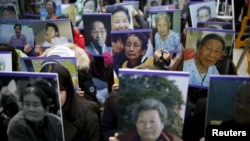U.S. experts say the agreement struck between South Korea and Japan on World War II "comfort women" is a significant step forward in improving relations between the neighboring countries.
After 12 rounds of negotiations that lasted 20 months, the two sides reached the deal this week to settle longtime disputes over Japan’s sexual enslavement of Korean women during the war. The agreement is viewed as a major breakthrough in efforts by both governments in Seoul and Tokyo to resolve the disputes and mend ties.
Shihoko Goto, senior associate for northeast Asia at the Wilson Center, a global affairs research group in Washington, hailed the deal as a “development of historical significance,” adding that the issue has been a “huge stumbling block” for the two sides.
Bruce Klingner, a senior research fellow at the Heritage Foundation, a conservative policy and research group in Washington, called the agreement a “stunning success achieved through diplomatic perseverance.”
End to 'vicious cycle'
David Straub, former director of the State Department’s Korea Desk, said the deal would ease tensions between the two allies of the United States if it was fully implemented.
“This agreement will likely change what had been a vicious cycle in their bilateral relations, making it possible to make progress on other issues,” Straub said.
Kent Boydston, a research analyst at the Peterson Institute for International Economics in Washington, said both sides made concessions to reach a deal. In the accord announced by foreign ministers of both countries, Japan’s Prime Minister Shinzo Abe offered a more direct and clearer apology for his country’s wartime action than he has in the past and pledged more than $8 million to support the victims.
“Prime Minister Abe expresses anew his most sincere apologies and remorse to all the women who underwent immeasurable and painful experiences and suffered incurable physical and psychological wounds as comfort women,” Japan’s Foreign Minister Fumio Kishida told reporters in Seoul. But the deal did not mention Japan’s legal responsibility for the past aggression, which was sought by South Korea.
Public backlash
However, some say the comfort women issue is far from settled, despite the latest agreement.
“It is highly unlikely that this will truly be a final and irrevocable resolution to the issue," Boydston said. "One of the hardest parts for both sides is to keep a unified front within their camps.”
Gregg Brazinsky, a specialist on U.S.-East Asian relations at George Washington University in Washington, cited dissatisfaction with the exact terms of the agreement among the victims.
“While the agreement will mean better relations between the two governments, I still find it troubling that the views and feelings of the victims do not seem to have fully been taken into account,” Brazinsky said.
On Wednesday, 700 South Koreans participated in what has been a weekly rally in front of the Japanese Embassy in Seoul to protest the agreement. The protesters demanded a direct apology from the Japanese leader and legal compensation for the suffering of the victims.
It is estimated that more than 200,000 women, mainly from Korea and China, were forced to work in Japan’s wartime brothels.





